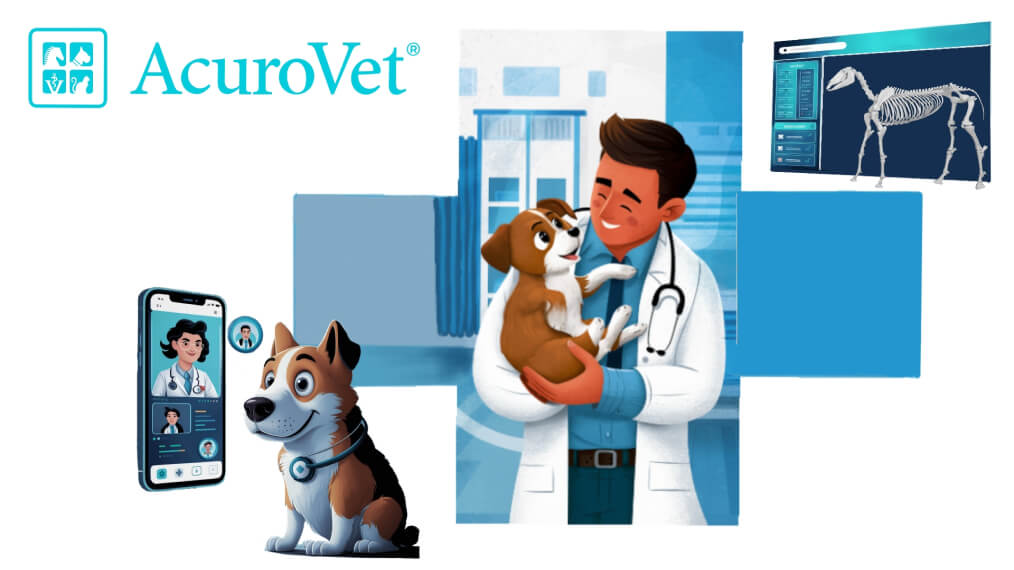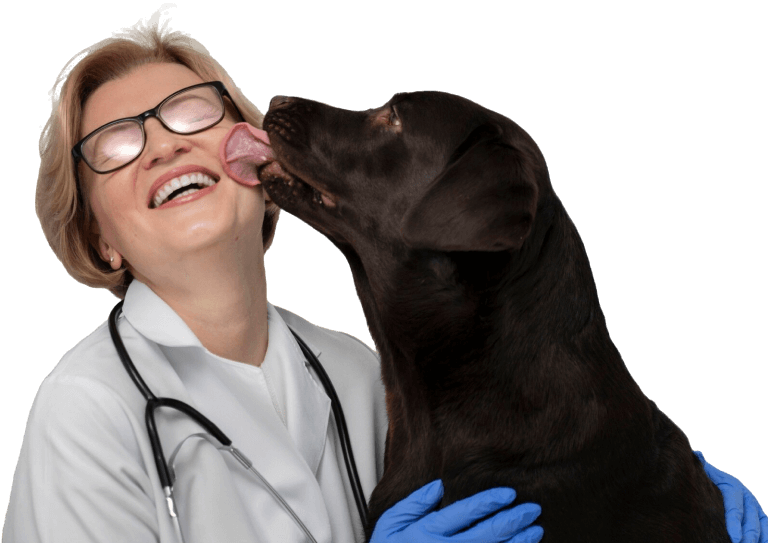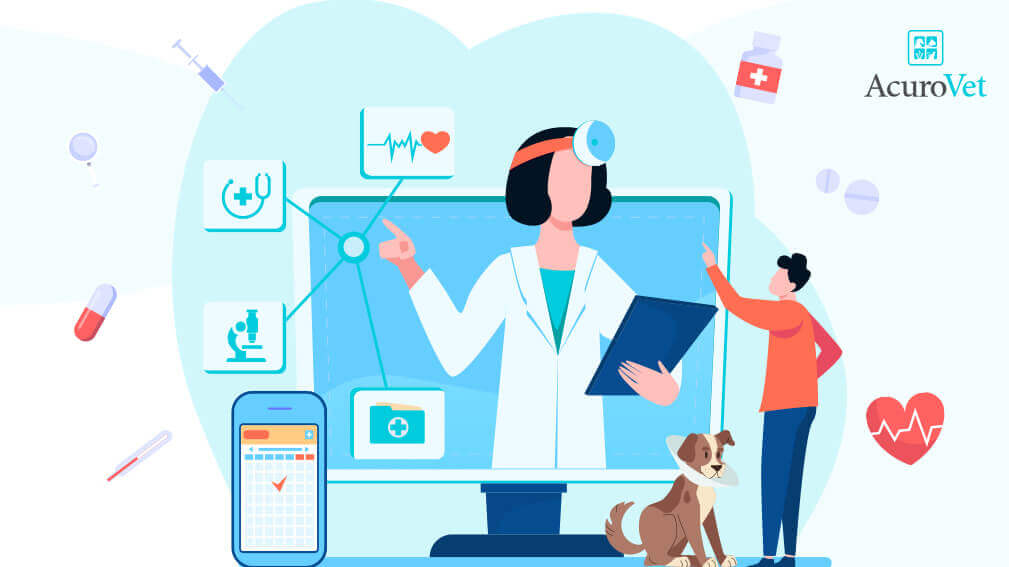
The Future of Veterinary Medicine in 2025: Trends, Technologies & AcuroVet
Explore the cutting-edge advancements in veterinary medicine in 2025, Including telehealth, AI diagnostics to robotic surgery,3D printing and more. Learn how AcuroVet is leading these innovations to enhance animal healthcare, and transform veterinary practice management for a better future.

- Introduction
- Trends in Veterinary Medicine in 2025
- Bridging the Gap: Telemedicine and Telehealth
- AI in Veterinary Medicine
- Data Integration and Electronic Health Records
- Pioneering the Future: Robotic Surgery in Veterinary Medicine
- Alternative Therapies, Holistic Care, Genetic Therapy, and Personalized Treatments
- The Future of Veterinary Records: Cloud-Based Solutions
- FAQ
In our journey into the fascinating realm of veterinary medicine, where innovation meets compassion to enhance lives, we have been able to discover unimaginable possibilities and healthcare solutions in the field of animal healthcare and veterinary medicine.
As the world evolves, so does the field of veterinary medicine. Gone are the days of traditional treatments and limited diagnostics. Today, we stand on the brink of a new era, where advancements in science and technology are revolutionizing the trends in veterinary medicine.
Since we are talking about the current trends in Veterinary medicine, AcuroVet emerges as a trailblazer, leading the charge with innovative solutions that empower veterinarians to provide the highest standard of care. From state-of-the-art diagnostics to cutting-edge treatments, Veterinary care in 2025 is at the forefront of driving positive change in veterinary medicine.
Join us as we delve into the exciting developments shaping the future of veterinary medicine, explore the transformative impact of emerging technologies, and discover how AcuroVet is reshaping the way we approach animal healthcare.
In veterinary medicine, several prominent trends are shaping the future of animal healthcare, ushering in a new era of innovation and progress. Technological advancements play a pivotal role in veterinary medicine, with the rise of telehealth and telemedicine enabling remote consultations, monitoring, and even surgical procedures. Telehealth has left a great impact on surgical procedures with implementation of Preoperative Consultations, Patient Education, Remote Monitoring, Telementoring, Robotic Surgeries and Remote Supervision. This trend not only enhances accessibility to veterinary care but also fosters greater collaboration between pet owners and veterinarians.
Another significant trend is the growing interest in alternative and complementary therapies, such as acupuncture, chiropractic care, and herbal medicine. As pet owners seek holistic approaches to address their pets' health issues, veterinarians are increasingly incorporating these modalities into their practice. It has been observed that Veterinarians are directing their patients to other practitioners who specialize in holistic approaches to animal healthcare.
There is also an increasing emphasis on preventive care and wellness, with pet owners recognizing the importance of routine check-ups, vaccinations, and nutrition in ensuring their pets' long-term health and happiness.
Moreover, there is a noticeable shift towards personalized medicine in veterinary care, with advancements in genetics, pharmacogenomics, and precision medicine enabling tailored treatment plans for individual animals based on their unique genetic makeup and health profiles.
Overall, these trends underscore the evolving nature of veterinary medicine, as practitioners and pet owners alike embrace new approaches and technologies to ensure the well-being of our animal companions in the years to come.
The landscape of veterinary medicine in 2025 has been undergoing a remarkable transformation, largely fuelled by the integration of telemedicine and telehealth solutions. As technology continues to advance at an unprecedented pace, so does our ability to extend veterinary care beyond the confines of traditional clinic settings.
Telemedicine, the practice of providing veterinary care remotely through electronic communication channels, has emerged as a powerful tool for connecting veterinarians with pet owners, regardless of geographical barriers. Telehealth, on the other hand, encompasses a broader spectrum of services aimed at promoting animal health and well-being through technology.
Together, telemedicine and telehealth represent a paradigm shift in veterinary care, offering unprecedented convenience, accessibility, and efficiency for both veterinarians and pet owners alike.
“A recent study shed light on pet owners' preferences for curb-side veterinary visits. Of the 1000 participants surveyed, a significant 86% found these visits effective, with 28% rating them superior to in-clinic appointments. Additionally, 48% expressed their intent to continue using curb-side services post-pandemic. The pandemic accelerated our reliance on remote interactions, a trend expected to persist. As younger generations embrace technology, including telemedicine, demand for veterinary telehealth is set to soar. It's clear, the industry must adapt to meet these evolving preferences in a digital age.”

In the field of veterinary medicine, the integration of Artificial Intelligence (AI) and Machine Learning represents a seismic shift in how we approach diagnosis and automate processes. This transformative fusion of technology with traditional veterinary practices holds the promise of revolutionizing patient care and streamlining administrative tasks. From enhancing diagnostic accuracy to automating routine tasks, these advanced technologies are reshaping the veterinary profession in profound ways.
- AI-driven diagnostic tools, adept at analyzing medical images like X-rays and MRIs, aid in identifying conditions early on, even detecting subtle abnormalities overlooked by human eyes.
- Through scrutinizing electronic health records and patient data, AI predicts disease risk factors, enabling veterinarians to take pre-emptive action and recommend preventive measures.
- AI algorithms personalize treatment plans, considering an animal's medical history, genetics, and response to therapies, ensuring optimized outcomes and minimal side effects.
- In veterinary pharmaceutical research, AI expedites drug discovery by analyzing vast datasets and identifying potential candidates, paving the way for novel therapies.
Overall, AI stands poised to revolutionize veterinary medicine, offering improved diagnostic accuracy, personalized treatments, advanced research capabilities, and streamlined administrative processes, ensuring animals receive the highest quality, evidence-based care worldwide.
Data integration and EHRs empower veterinarians with comprehensive patient information, facilitating precise diagnosis and tailored treatment plans for improved health outcomes. By analyzing large datasets, EHR systems drive advanced diagnostics and research, leading to new insights and innovations in disease management.
Furthermore, EHRs foster seamless collaboration among veterinary professionals, researchers, and pet owners, enhancing interdisciplinary teamwork and coordination of care. Additionally, EHR systems support telemedicine and remote monitoring, expanding access to veterinary care and enabling early intervention.
By integrating predictive analytics, EHRs help veterinarians anticipate and prevent health issues, reducing the incidence of preventable diseases and promoting overall wellness. In essence, data integration and electronic health records are essential tools driving progress in veterinary medicine, enabling precision, collaboration, and innovation in care delivery.
Robotic surgery in veterinary medicine involves the use of advanced robotic systems controlled by highly trained veterinarians. These systems offer enhanced precision, dexterity, and visualization, allowing surgeons to perform complex procedures with unparalleled accuracy.
Minimally invasive procedures, such as laparoscopy and arthroscopy, have become increasingly popular in veterinary medicine. Minimally invasive procedures offer numerous benefits, including reduced surgical trauma, faster recovery times, and improved cosmetic outcomes.
With the adoption of robotic surgery and minimally invasive procedures in veterinary medicine, veterinarians can continue to push the boundaries of what is possible in animal healthcare.
The recognition of each animal's uniqueness has sparked a shift towards holistic and personalized veterinary care. Practitioners now embrace alternative therapies like acupuncture and herbal medicine, aiming to address both symptoms and underlying causes.
Holistic care goes beyond treating ailments, focusing on preventive measures, nutrition, and lifestyle factors for overall wellness.
Genetic therapy, or genomic medicine, uses cutting-edge genetics to diagnose, treat, and prevent genetic diseases. Personalized treatments consider genetic, physiological, and environmental factors for tailored care. This integration marks a transformative change towards a more individualized and comprehensive approach to animal health and well-being.
The domain of veterinary medicine is undergoing swift technological progressions, heralding novel diagnostic methodologies, treatment paradigms, and sophisticated practice management software suites. These systems are crucial components of modern veterinary management, designed to identify, streamline, and optimize the daily operations and problems of veterinary clinics and hospitals.
Recent scientific research by Royal Canin that focused on the major pain points for veterinarians, identified the top concerns – 53% of all respondents said that administration tasks were either their number one or two concerns.
These bring us to define the role of cloud-based solutions in veterinary records, a futuristic approach to PIMS. There are various features that emphasize to provide a better, futuristic solution to the Veterinary Management System
The trajectory of veterinary records is shifting towards cloud-based solutions such as AcuroVet, which provides unmatched efficiency and accessibility. Through the utilization of cutting-edge technology, veterinary practices can optimize data management, enforce stringent security measures, and streamline operational workflows.
Say goodbye to scattered patient records, complicated scheduling, and manual billing. Our intuitive platform consolidates everything you need - from Appointment Scheduling, Patient Medical Records, Inventory Management, Offline Accessibility & Tablet Application, Image-based forms, Invoicing, and Client Communications With Multi Currency & Language Support all in one convenient place, saving your time and reducing administrative headaches.
But that's just the beginning. With AcuroVet, you'll also experience robust reporting and analytics features, and built-in security measures to protect your patients' sensitive data. Our scalable and customizable solution can grow with your practice, whether you're a small clinic or a large multi-location facility.
And the best part? Our dedicated support team is here to guide you every step of the way. From initial setup to ongoing training and updates, we're committed to ensuring that you get the most out of AcuroVet.
So why wait? Join the thousands of veterinary professionals who are already experiencing the benefits of AcuroVet. Discover a new era of efficiency, productivity, and patient care with AcuroVet - because your practice deserves the best. Click here to book your Free Demo
AcuroVet is a cloud-based platform that offers everything you need from Appointment Scheduling, Patient Medical Records, Inventory Management, Offline Accessibility & Tablet Application, Image-based forms, Invoicing, and Client Communications With multi-currency & Language Support all in one convenient place, saving your time and reducing administrative headaches.
Our dedicated support team is here to guide you every step of the way. From initial setup to ongoing training and updates, we're committed to ensuring you get the most out of AcuroVet.
Yes, you can experience all AcuroVet features with a risk-free trial of 30 Days plus personalized Training and Support are also included.
AcuroVet is a cloud-based veterinary practice management software. So, you can access it from any device(Desktop, Laptop, Tablet).
Yes. Free personalized training and onboarding support are given by our Customer Support team.
Holistic Veterinarians focus more on an alternative approach to healing which usually recommends various alternative treatments and lifestyle changes before referring to medicines.
Yes, absolutely. One of the key advantages of 3D printing is its ability to rapidly prototype and iterate designs. Veterinarians can create multiple iterations of prosthetics or implants quickly, allowing for refinement of the design to better suit the patient's needs.
Its advantages include producing precise prosthetics and implants, reducing costs and time, and benefiting a wide range of animals.
Genetic therapy, also known as genomic medicine, utilizes cutting-edge genetics to diagnose, treat, and prevent genetic diseases in animals. Personalized treatments take into account genetic, physiological, and environmental factors to provide tailored care.
By enabling veterinarians to perform surgeries with enhanced precision and reduced trauma, robotic surgery and minimally invasive procedures push the boundaries of what is possible in animal healthcare, leading to improved patient outcomes and quality of care.
Veterinary software like AcuroVet has features like Telemedicine, Cloud-based solutions, EHR, Automatic Messaging, and Holistic modules(Image-based forms). These features increase efficiency and improve overall pet health by integrating most of the recent trends in veterinary medicine.

webinars, blogs, resources & more.
30 Days!

Recent blog posts

May 08, 2024
practice managementNo More Calendar Chaos
Managing patient records, handling billing and insurance-related paperwork, and – (growl) –scheduling appointments consumes valuable hours you could devote to patient care.

Mar 22, 2024
productGet Ready! AcuroVet®’s Telemedicine Module Is In Beta-Testing!
Explore AcuroVet®'s new telemedicine module in beta-testing, simplifying veterinary practice with efficient online appointments and client management. Designed by founder Dr. Maureen Kelleher, this user-friendly tool enhances scheduling flexibility, reduces clinic congestion, and meets the growing demand for telemedicine in veterinary care


